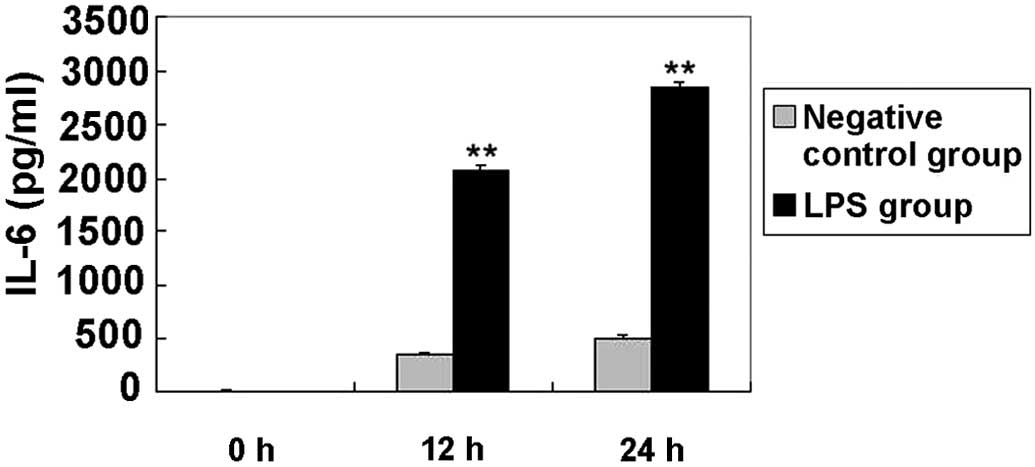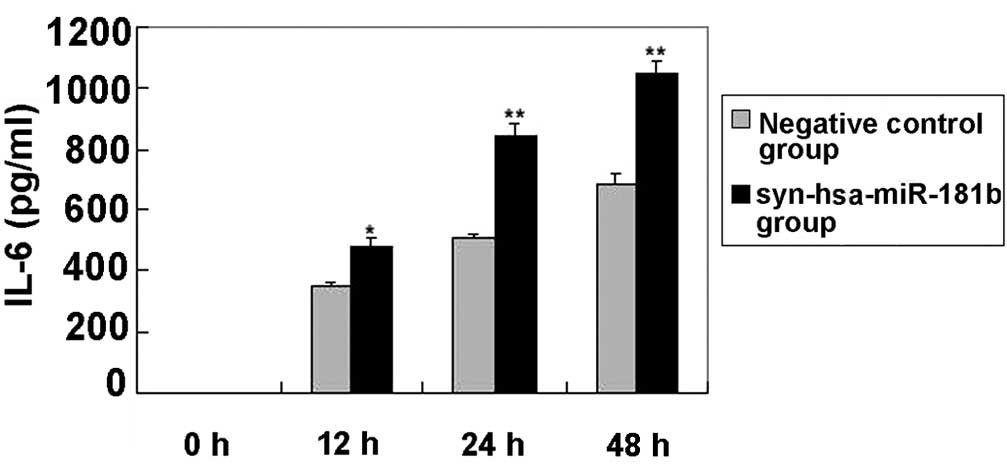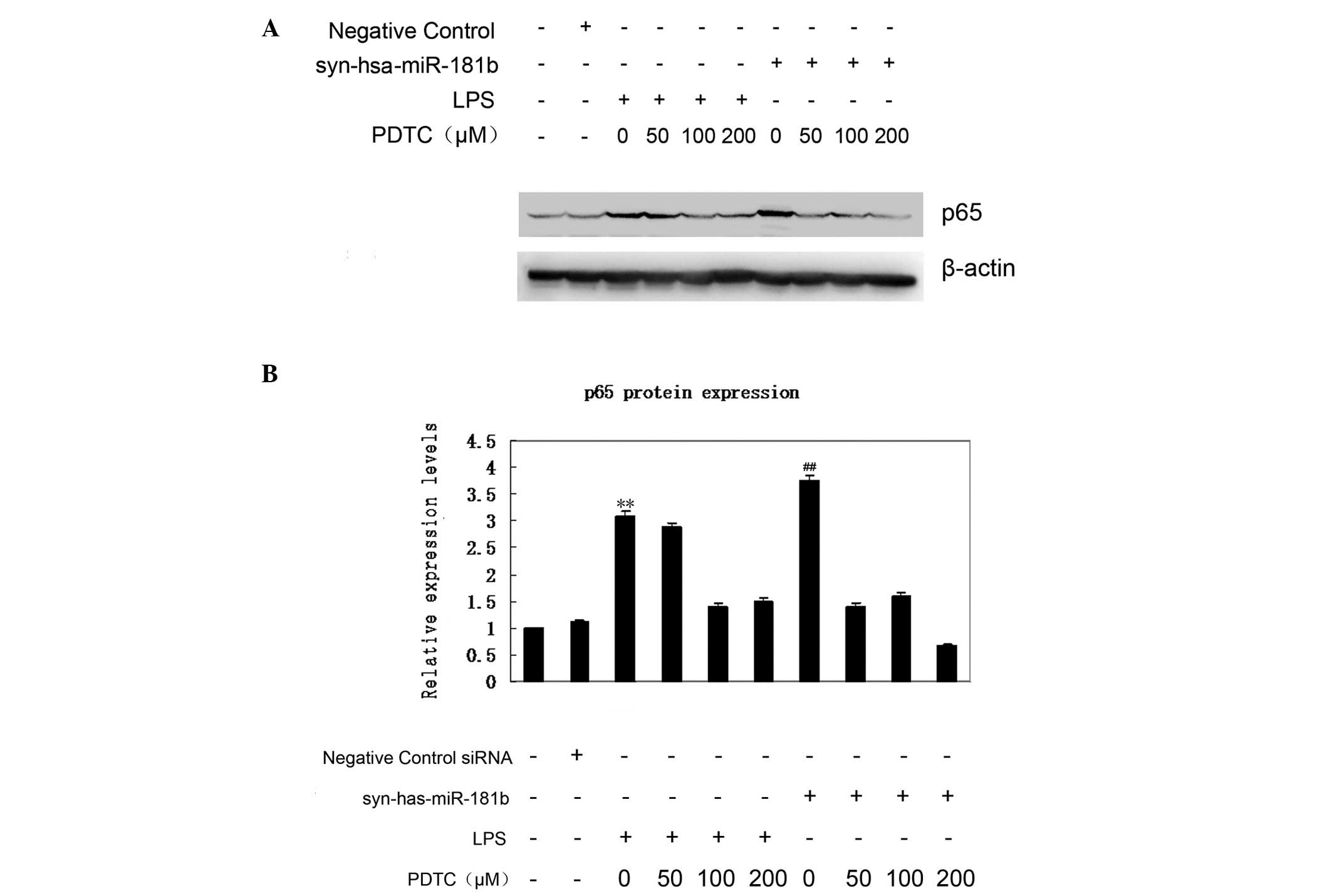|
1
|
Avecillas JF, Freire AX and Arroliga AC:
Clinical epidemiology of acute lung injury and acute respiratory
distress syndrome: Incidence, diagnosis and outcomes. Clin Chest
Med. 27:549–557. 2006. View Article : Google Scholar : PubMed/NCBI
|
|
2
|
Ware LB and Matthay MA: The acute
respiratory distress syndrome. N Engl J Med. 342:1334–1349. 2000.
View Article : Google Scholar : PubMed/NCBI
|
|
3
|
Crosby LM and Waters CM: Epithelial repair
mechanisms in the lung. Am J Physiol Lung Cell Mol Physiol.
298:L715–L731. 2010. View Article : Google Scholar : PubMed/NCBI
|
|
4
|
Papi A and Johnston SL: Rhinovirus
infection induces expression of its own receptor intercellular
adhesion molecule 1 (ICAM-1) via increased NF-kappaB-mediated
transcription. J Biol Chem. 274:9707–9720. 1999. View Article : Google Scholar : PubMed/NCBI
|
|
5
|
Hoare GS, Chester AH, Yacoub MH and
Marczin N: Regulation of NF-kappaB and ICAM-1 expression in human
airway epithelial cells. Int J Mol Med. 9:35–44. 2002.PubMed/NCBI
|
|
6
|
Li Z, Zhang de K, Yi WQ, Ouyang Q, Chen YQ
and Gan HT: NF-kappaB p65 antisense oligonucleotides may serve as a
novel molecular approach for the treatment of patients with
ulcerative colitis. Arch Med Res. 39:729–734. 2008. View Article : Google Scholar : PubMed/NCBI
|
|
7
|
Bartel DP: MicroRNAs: Target recognition
and regulatory functions. Cell. 136:215–233. 2009. View Article : Google Scholar : PubMed/NCBI
|
|
8
|
Guo H, Ingolia NT, Weissman JS and Bartel
DP: Mammalian microRNAs predominantly act to decrease target mRNA
levels. Nature. 466:835–840. 2010. View Article : Google Scholar : PubMed/NCBI
|
|
9
|
Bartel DP: MicroRNAs: Genomics,
biogenesis, mechanism and function. Cell. 116:281–297. 2004.
View Article : Google Scholar : PubMed/NCBI
|
|
10
|
Latronico MV and Condorelli G: MicroRNAs
and cardiac pathology. Nat Rev Cardiol. 6:419–429. 2009. View Article : Google Scholar : PubMed/NCBI
|
|
11
|
Port JD and Sucharov C: Role of microRNAs
in cardiovascular disease: Therapeutic challenges and potentials. J
Cardiovasc Pharmacol. 56:444–453. 2010. View Article : Google Scholar : PubMed/NCBI
|
|
12
|
Buechner J, Henriksen JR, Haug BH, Tømte
E, Flaegstad T and Einvik C: Inhibition of mir-21, which is
upregulated during MYCN knockdown-mediated differentiation, does
not prevent differentiation of neuroblastoma cells.
Differentiation. 81:25–34. 2011. View Article : Google Scholar : PubMed/NCBI
|
|
13
|
Li X, Zhang Y, Shi Y, Dong G, Liang J, Han
Y, Wang X, Zhao Q, Ding J, Wu K, et al: MicroRNA-107, an oncogene
microRNA that regulates tumour invasion and metastasis by targeting
DICER1 in gastric cancer. J Cell Mol Med. 15:1887–1895. 2011.
View Article : Google Scholar : PubMed/NCBI
|
|
14
|
O'Connell RM, Rao DS, Chaudhuri AA and
Baltimore D: Physiological and pathological roles for microRNAs in
the immune system. Nat Rev Immunol. 10:111–122. 2010. View Article : Google Scholar : PubMed/NCBI
|
|
15
|
Oglesby IK, McElvaney NG and Greene CM:
MicroRNAs in inflammatory lung disease-master regulators or target
practice? Respir Res. 11:1482010. View Article : Google Scholar : PubMed/NCBI
|
|
16
|
Roggli E, Britan A, Gattesco S, Lin-Marq
N, Abderrahmani A, Meda P and Regazzi R: Involvement of microRNAs
in the cytotoxic effects exerted by proinflammatory cytokines on
pancreatic beta-cells. Diabetes. 59:978–986. 2010. View Article : Google Scholar : PubMed/NCBI
|
|
17
|
Angulo M, Lecuona E and Sznajder JI: Role
of MicroRNAs in lung disease. Arch Bronconeumol. 48:325–330.
2012.(In English, Spanish). View Article : Google Scholar : PubMed/NCBI
|
|
18
|
Cai ZG, Zhang SM, Zhang Y, Zhou YY, Wu HB
and Xu XP: MicroRNAs are dynamically regulated and play an
important role in LPS-induced lung injury. Can J Physiol Pharmacol.
90:37–43. 2012. View
Article : Google Scholar : PubMed/NCBI
|
|
19
|
Xie T, Liang J, Liu N, Wang Q, Li Y, Noble
PW and Jiang D: MicroRNA-127 inhibits lung inflammation by
targeting IgG Fcγ receptor I. J Immunol. 188:2437–2444. 2012.
View Article : Google Scholar : PubMed/NCBI
|
|
20
|
Iliopoulos D, Jaeger SA, Hirsch HA, Bulyk
ML and Struhl K: STAT3 activation of miR-21 and miR-181b-1 via PTEN
and CYLD are part of the epigenetic switch linking inflammation to
cancer. Mol Cell. 39:493–506. 2010. View Article : Google Scholar : PubMed/NCBI
|
|
21
|
Wang YZ, Mao GX, Lv YD, Huang QD and Wang
GF: MicroRNA-181b stimulates inflammation via the NF-kappa B
signaling pathway in vitro. J Am Geriatr Soc. 62:S394.
2014.
|
|
22
|
Schulz C, Farkas L, Wolf K, Kratzel K,
Eissner G and Pfeifer M: Differences in LPS-induced activation of
bronchial epithelial cells (BEAS-2B) and type II-like pneumocytes
(A-549). Scand J Immunol. 56:294–302. 2002. View Article : Google Scholar : PubMed/NCBI
|
|
23
|
Pencheva N, Tran H, Buss C, Huh D,
Dorbnjak M, Busam K and Tavazoie SF: Concergent multi-miRNA
targeting of ApoE drives LRP1/LRP8-dependent melanoma metastasis
and angiogenesis. Cell. 151:1068–1082. 2012. View Article : Google Scholar : PubMed/NCBI
|
|
24
|
Ma Y, Zhang P, Wang F, Zhang H, Yang J,
Peng J, Liu W and Qin H: miR-150 as a potential biomarker
associated with prognosis and therapeutic outcome in colorectal
cancer. Gut. 61:1447–1453. 2012. View Article : Google Scholar : PubMed/NCBI
|
|
25
|
Elder ACP, Gelein R, Finkelstein JN, Cox C
and Oberdorster G: Endotoxin priming affects the lung response to
ultrafine particles and ozone in young and old rats. Inhalation
Toxicology. 12:(Suppl 1). 85–98. 2000. View Article : Google Scholar
|
|
26
|
Meduri GU, Headley S, Kohler G, Stentz F,
Tolley E, Umberger R and Leeper K: Persistent elevation of
inflammatory cytokines predicts a poor outcome in ARDS. Plasma IL-1
beta and IL-6 levels are consistent and efficient predictors of
outcome over time. Chest. 107:1062–1073. 1995. View Article : Google Scholar : PubMed/NCBI
|
|
27
|
Dave RS and Khalili K: Morphine treatment
of human monocyte-derived macrophages induces differential miRNA
and protein expression: Impact on inflammation and oxidative stress
in the central nervous system. J Cell Biochem. 110:834–845. 2010.
View Article : Google Scholar : PubMed/NCBI
|
|
28
|
Ma X, Becker Buscaglia LE, Barker JR and
Li Y: MicroRNAs in NF-kappaB signaling. J Mol Cell Biol. 3:159–166.
2011. View Article : Google Scholar : PubMed/NCBI
|
|
29
|
Nelson S and Martin TR: Cytokines in
Pulmonary Disease: Infection and Inflammation (Lung Biology in
Health and Disease). Martin T: 141:(1st). Marcel Dekker. (New York,
NY). 2000.PubMed/NCBI
|
|
30
|
Pedersen I and David M: MicroRNAs in the
immune response. Cytokine. 43:391–394. 2008. View Article : Google Scholar : PubMed/NCBI
|
|
31
|
Sun X, Icli B, Wara AK, Belkin N, He S,
Kobzik L, Hunninghake GM, Vera MP, MICU Registry, Blackwell TS, et
al: MicroRNA-181b regulates NF-κB-mediated vascular inflammation. J
Clin Invest. 122:1973–1990. 2012.PubMed/NCBI
|
|
32
|
Koyama S, Sato E, Nomura H, Kubo K, Miura
M, Yamashita T, Nagai S and Izumi T: The potential of various
lipopolysaccharides to release monocyte chemotactic activity from
lung epithelial cells and fibroblasts. Eur Respir J. 14:545–552.
1999. View Article : Google Scholar : PubMed/NCBI
|
|
33
|
Reddel RR, Ke Y, Gerwin BI, McMenamin MG,
Lechner JF, Su RT, Brash DE, Park JB, Rhim JS and Harris CC:
Transformation of human bronchial epithelial cells by infection
with SV40 or adenovirus-12 SV40 hybrid virus, or transfection via
strontium phosphate coprecipitation with a plasmid containing SV40
early region genes. Cancer Res. 48:1904–1909. 1988.PubMed/NCBI
|
|
34
|
Boots AW, Gerloff K, Bartholomé R, van
Berlo D, Ledermann K, Haenen GR, Bast A, van Schooten FJ, Albrecht
C and Schins RP: Neutrophils augment LPS-mediated pro-inflammatory
signaling in human lung epithelial cells. Biochim Biophys Acta.
1823:1151–1162. 2012. View Article : Google Scholar : PubMed/NCBI
|
|
35
|
Yeh CH, Cho W, So EC, Chu CC, Lin MC, Wang
JJ and Hsing CH: Propofol inhibits lipopolysaccharide-induced lung
epithelial cell injury by reducing hypoxia-inducible factor-1alpha
expression. Br J Anaesth. 106:590–599. 2011. View Article : Google Scholar : PubMed/NCBI
|
|
36
|
Fortis S, Spieth PM, Lu WY, Parotto M,
Haitsma JJ, Slutsky AS, Zhong N, Mazer CD and Zhang H: Effects of
anesthetic regimes on inflammatory responses in a rat model of
acute lung injury. Intensive Care Med. 38:1548–1555. 2012.
View Article : Google Scholar : PubMed/NCBI
|
|
37
|
Mittal N and Sanyal SN: In vivo effect of
surfactant on inflammatory cytokines during endotoxin-induced lung
injury in rodents. J Immunotoxicol. 8:274–283. 2011. View Article : Google Scholar : PubMed/NCBI
|
|
38
|
Cheng DS, Han W, Chen SM, Sherrill TP,
Chont M, Park GY, Sheller JR, Polosukhin VV, Christman JW, Yull FE,
et al: Airway epithelium controls lung inflammation and injury
through the NF-kappa B pathway. J Immunol. 178:6504–6513. 2007.
View Article : Google Scholar : PubMed/NCBI
|
|
39
|
Tang PS, Mura M, Seth R and Liu M: Acute
lung injury and cell death: How many ways can cells die? Am J
Physiol Lung Cell Mol Physiol. 294:L632–L641. 2008. View Article : Google Scholar : PubMed/NCBI
|
|
40
|
Veranth JM, Reilly CA, Veranth MM, Moss
TA, Langelier CR, Lanza DL and Yost GS: Inflammatory cytokines and
cell death in BEAS-2B lung cells treated with soil dust,
lipopolysaccharide and surface-modified particles. Toxicol Sci.
82:88–96. 2004. View Article : Google Scholar : PubMed/NCBI
|
|
41
|
Stern JB, Jaffré S, Dehoux M and Crestani
B: Keratinocyte growth factor and Hepatocyte growth factor: Their
roles in alveolar epithelial repair. Rev Mal Respir. 20:896–903.
2003.PubMed/NCBI
|
|
42
|
Hoke TS, Douglas IS, Klein CL, He Z, Fang
W, Thurman JM, Tao Y, Dursun B, Voelkel NF, Edelstein CL, et al:
Acute renal failure after bilateral nephrectomy is associated with
cytokine-mediated pulmonary injury. J Am Soc Nephrol. 18:155–164.
2007. View Article : Google Scholar : PubMed/NCBI
|
|
43
|
Hayden MS and Ghosh S: Shared principles
in NF-kappaB signaling. 132:344–362. 2008.
|
|
44
|
Kawai M, Nishikomori R, Jung EY, Tai G,
Yamanaka C, Mayumi M and Heike T: Pyrrolidine dithiocarbamate
inhibits intercellular adhesion molecule-1 biosynthesis induced by
cytokines in human fibroblasts. J Immunol. 154:2333–2341.
1995.PubMed/NCBI
|
|
45
|
Schreck R, Meier B, Männel DN, Dröge W and
Baeuerle PA: Dithiocarbamates as potent inhibitors of nuclear
factor kappa B activation in intact cells. J Exp Med.
175:1181–1194. 1992. View Article : Google Scholar : PubMed/NCBI
|
|
46
|
Zhang M, Zhou SH, Li XP, Shen XQ, Fang ZF,
Liu QM, Qiu SF and Zhao SP: Atorvastatin downregulates BMP-2
expression induced by oxidized low-density lipoprotein in human
umbilical vein endothelial cells. Circ J. 72:807–812. 2008.
View Article : Google Scholar : PubMed/NCBI
|
|
47
|
Griffiths-Jones S: The microRNA Registry.
Nucleic Acids Res. 32:D109–D111. 2004. View Article : Google Scholar : PubMed/NCBI
|
|
48
|
Fang Y, Shi C, Manduchi E, Civelek M and
Davies PF: MicroRNA-10a regulation of proinflammatory phenotype in
athero-susceptible endothelium in vivo and in vitro. Proc Natl Acad
Sci USA. 107:13450–13455. 2010. View Article : Google Scholar : PubMed/NCBI
|
|
49
|
Suárez Y, Wang C, Manes TD and Pober JS:
Cutting edge: TNF-induced microRNAs regulate TNF-induced expression
of E-selectin and intercellular adhesion molecule-1 on human
endothelial cells: Feedback control of inflammation. J Immunol.
184:21–25. 2010. View Article : Google Scholar : PubMed/NCBI
|
|
50
|
Pugin J, Ricou B, Steinberg KP, Suter PM
and Martin TR: Proinflammatory activity in bronchoalveolar lavage
fluids from patients with ARDS, a prominent role for interleukin-1.
Am J Respir Crit Care Med. 153:1850–1856. 1996. View Article : Google Scholar : PubMed/NCBI
|


















